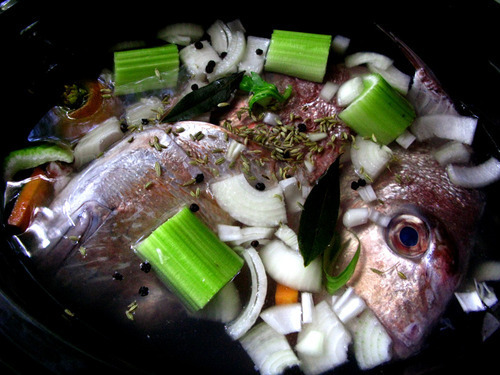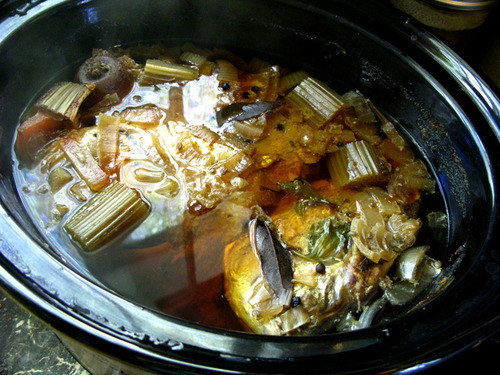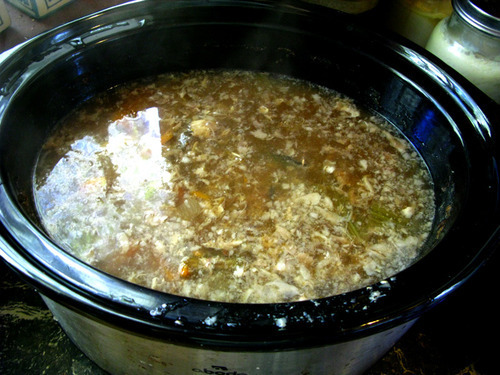Fish Head Soup
“Good broth will resurrect the dead” – South American proverb.

Another South American proverb goes – “Fish broth will cure anything”. And one last quote, this time from Barnes and Barnes – “Fish heads, fish heads, roly poly fish heads. Fish heads, fish heads, eat them up yum!” Why should we make stocks and broths from scratch? Isn’t it easier to get one of those packets or cartons from the supermarket? It certainly is easier, they don’t taste too bad, so is the hard way worth all the extra effort?

This a recipe for fish head soup from a fish broth, so obviously my answer will be “yes, it is worth the effort”. Here are a few reasons why. A good fish head soup is rich in gelatin. Gelatin, as well as being useful for treating some specific complaints such as ulcers, diabetes or muscle wasting disorders, is a hydrophilic colloid which attracts and holds digestive juices to food in our gut. Fish head soup is rich in calcium and other minerals, and we add vinegar initially to assist with the extraction of bone minerals. Fish heads with the thyroid glands intact give us iodine and thyroid strengthening substances derived from the glands. Broths also offer us a world of taste without the need to rely on neurotoxins like MSG. Artificial stocks and flavourings are not only toxic, but their primary function is to trick us into believing that the bland and nutritionally dead foods they adorn are actually health-giving.
So, get stuck into some roly poly fish heads – your body will thank you. Without further ado …
Fish Head Soup with Kumara and Turmeric
3 large fish heads
2 carrots (plus tops)
2 celery sticks (plus tops)
1 large onion
1 tsp peppercorns
1 tsp fennel seeds
2 bay leaves
Dash of apple cider vinegar
2 tsp salt
1 kumara (purple sweet potato)
2 spring onions
2 inches grated daikon root
1 good strip of wakame, cut into small pieces
Thumb-sized piece of turmeric root, grated
Coconut oil
2 star anise seeds
½ tsp cumin seeds
2 cloves of garlic
Thai coriander to garnish

In a slow cooker, place the fish heads, one roughly chopped carrot and both carrot tops, one roughly cut stick of celery and both tops (don’t worry overly if you don’t have the tops), the onion, roughly chopped, the peppercorns, fennel seeds, and bay leaves, then add water to cover the heads. Add the dash of vinegar and cook on the lowest heat possible for 24 hours, adding the salt at the 8 – 12 hour mark.

Take a heavy wooden spoon and break the fish heads up as much as you can in the pot. Pour the broth into a pot, straining out the bone and vegetables. Place the pot with the strained broth on a low heat, and add the diced kumara, and one diced carrot, letting the broth cook very gently for 20 minutes or so. Add one finely sliced celery stick, 2 finely chopped spring onions, and the grated daikon. Cook gently for another 10 minutes, then add the chopped wakame. Meanwhile take the star anise and cumin seeds and grind them in a mortar and pestle. Gently fry the grated turmeric in the coconut oil in a small pan. When it is softened, and the oil coloured, add the spices, a good amount of ground black pepper and the garlic. Fry gently, stirring continuously for a minute, then pour the contents of the pan into the soup pot. Cut Thai coriander and sprinkle into each bowl as a garnish.
Turmeric is one of best medicine foods going. Curcumin, the active principle, is fat soluble, so we fry turmeric in oil for maximum benefit. Black pepper, as well as being a great medicine food in it’s own right, is a catalyst for the uptake of curcumin by our body. One study indicates it may help us absorb 2000% more curcumin than if we take turmeric on its own. Thai coriander is a good nerve tonic, and unlike conventional coriander, this herb retains its flavour on drying. Kumara is high in anti-oxidants, and has anti-cancer and anti-coagulant properties. Like both turmeric and pepper, it is also anti-inflammatory. Kumara is also high in phytoestrogens, so may be helpful as part of a natural hormone replacement therapy protocol. It may also assist with menstrual problems, and with osteoporosis.
“The kumara has no need to boast of its sweetness” - Māori proverb